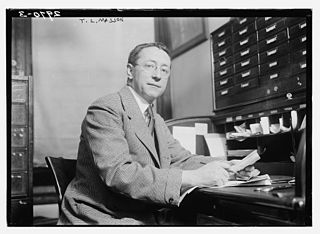A Quote by Martin Buber
The salvation of man does not lie in his holding himself far removed from the worldly, but in consecrating it to holy, to divine meaning.
Related Quotes
As long as a man is persuaded that he can make even the smallest contribution to his salvation, he remains self-confident and does not utterly despair of himself, and so is not humbled before God. Such a man plans out for himself a position, an occasion, a work, which shall bring him final salvation, but which will not.
How does God save His people from the pleasure of sin? The answer is, “By imparting to them a nature which hates evil and loves holiness.” This takes place when they are born again, so that actual salvation begins with regeneration. Of course it does; where else could it commence? Fallen man can neither perceive his desperate need of salvation, nor come to Christ for it, till he has been renewed by the Holy Spirit.
Some souls think that the Holy Spirit is very far away, far, far, up above. Actually he is, we might say, the divine Person who is most closely present to the creature. He accompanies him everywhere. He penetrates him with himself. He calls him, he protects him. He makes of him his living temple. He defends him. He helps him. He guards him from all his enemies. He is closer to him than his own soul. All the good a soul accomplishes, it carries out under his inspiration, in his light, by his grace and his help.
Practically every false doctrine comes from getting things out of order. God's divine order is salvation, then change; not change and then salvation! If one has to be changed to be saved, that's salvation by works. It is also salvation by the flesh. The truth is, one is cleansed from the sins of the flesh just as he is saved; by yielding to the Holy Spirit and letting Him do His work.
As a good Christian should consider every place as holy, because God is there, so he should look upon every part of his life as a matter of holiness, because it is offered unto God. The profession of a clergyman is a holy profession, because it is a ministration in holy things, an attendance at the alter. But worldly business is to be made holy unto the Lord, by being done as a service unto Him, and in conformity to His Divine will.
Mr. Langdon, I did not ask if you believe what man says about God. I asked if you believed in God. There is a difference. Holy scripture is stories...legends and history of man's quest to understand his own need for meaning. I am not asking you to pass judgment on literature. I am asking if you believe in God. When you lie out under the stars, do you sense the divine? Do you feel in your gut that you are staring up at the work of God's hands?
The Great Man's sincerity is of the kind he cannot speak of, is not conscious of: nay, I suppose, he is conscious rather of insincerity; for what man can walk accurately by the law of truth for one day? No, the Great Man does not boast himself sincere, far from that; perhaps does not ask himself if he is so: I would say rather, his sincerity does not depend on himself; he cannot help being sincere!
The natural inclination of man is to rely solely upon himself and to ignore the purpose of his existence as well as his relationship to God who is his spiritual father. If man will recognize his divine origin, he will then realize his Heavenly Father will not leave him alone to grope in darkness of mind and spirit, but will make available a power to influence him in right paths and into standards of good behavior. The Holy Ghost is that power.








































